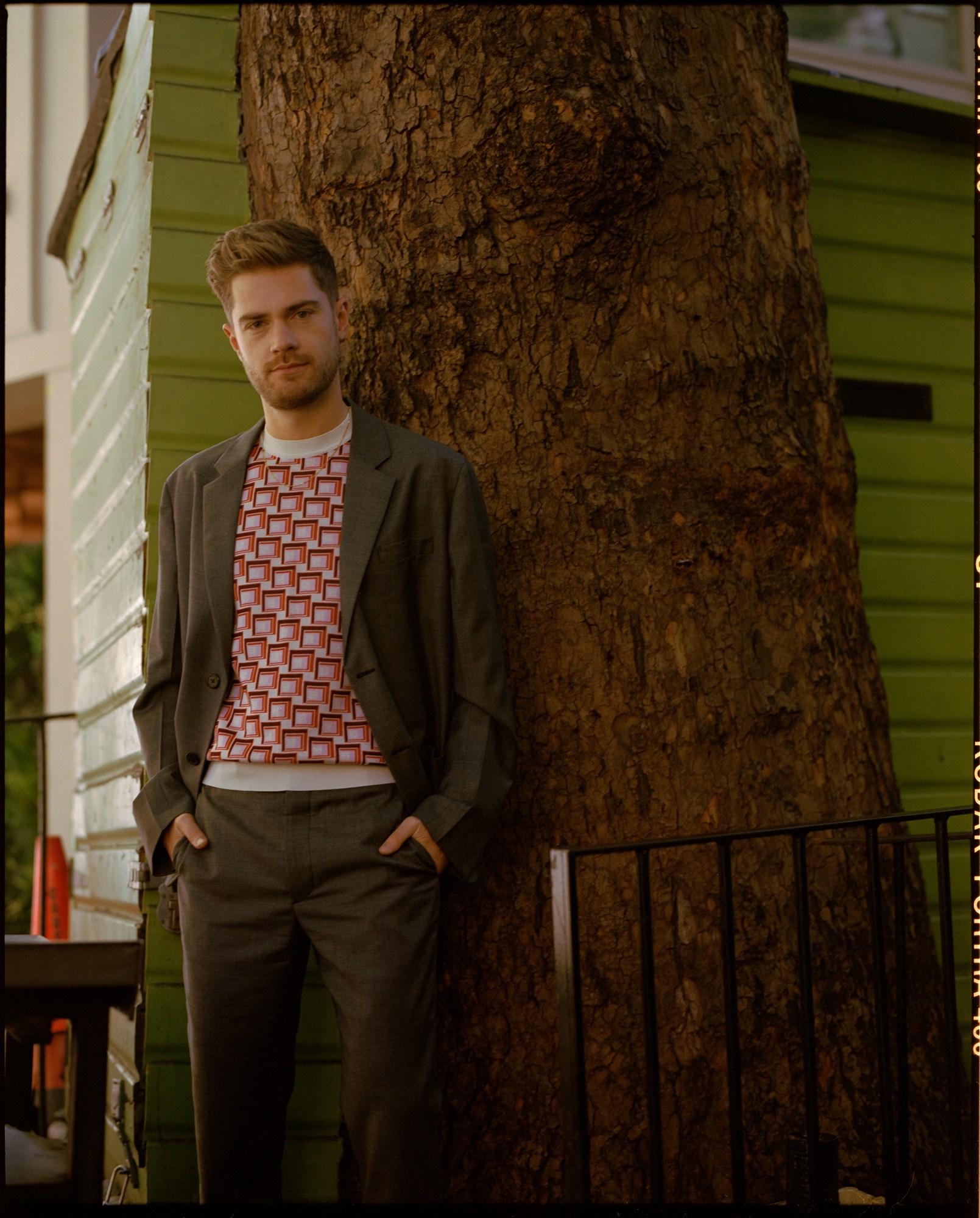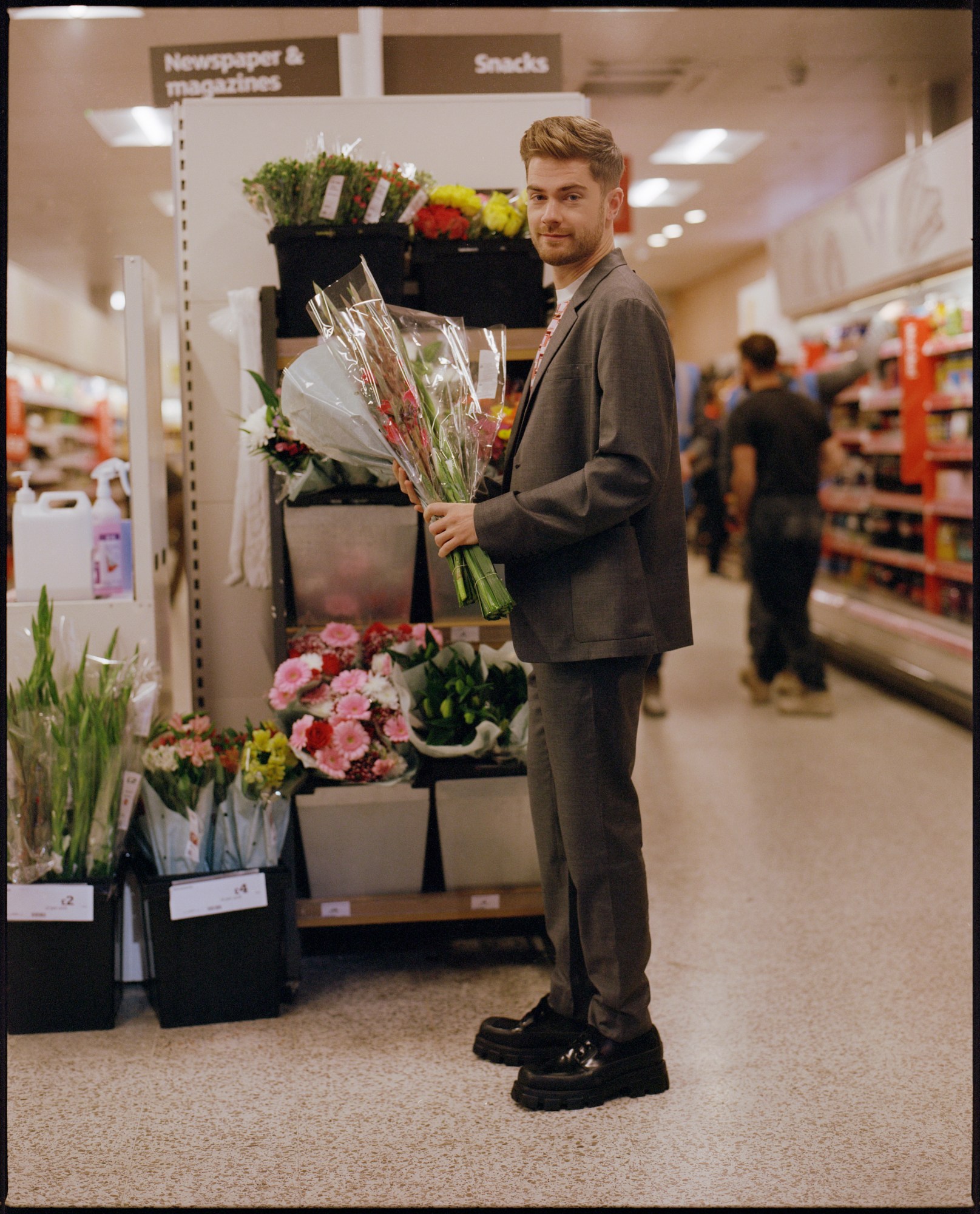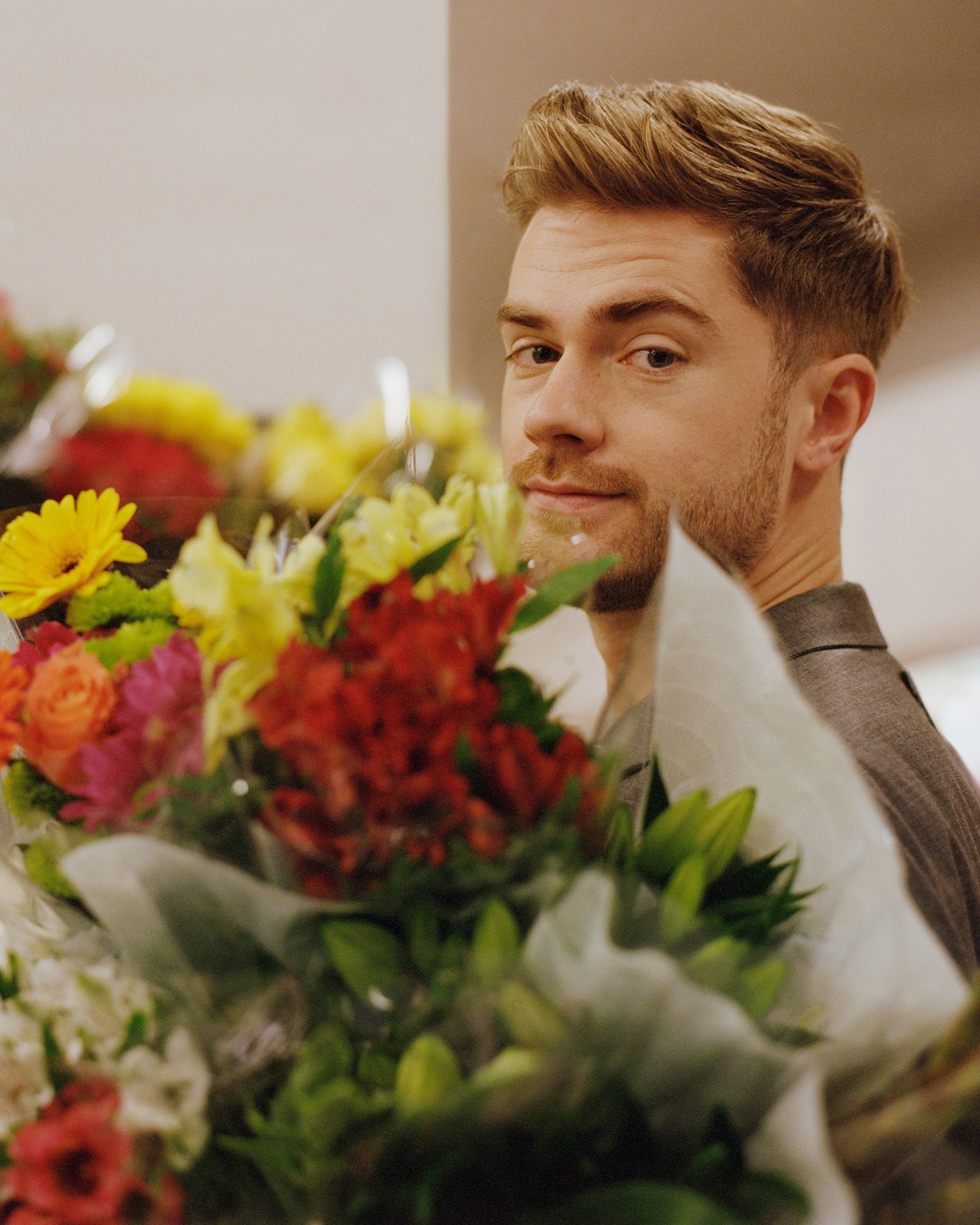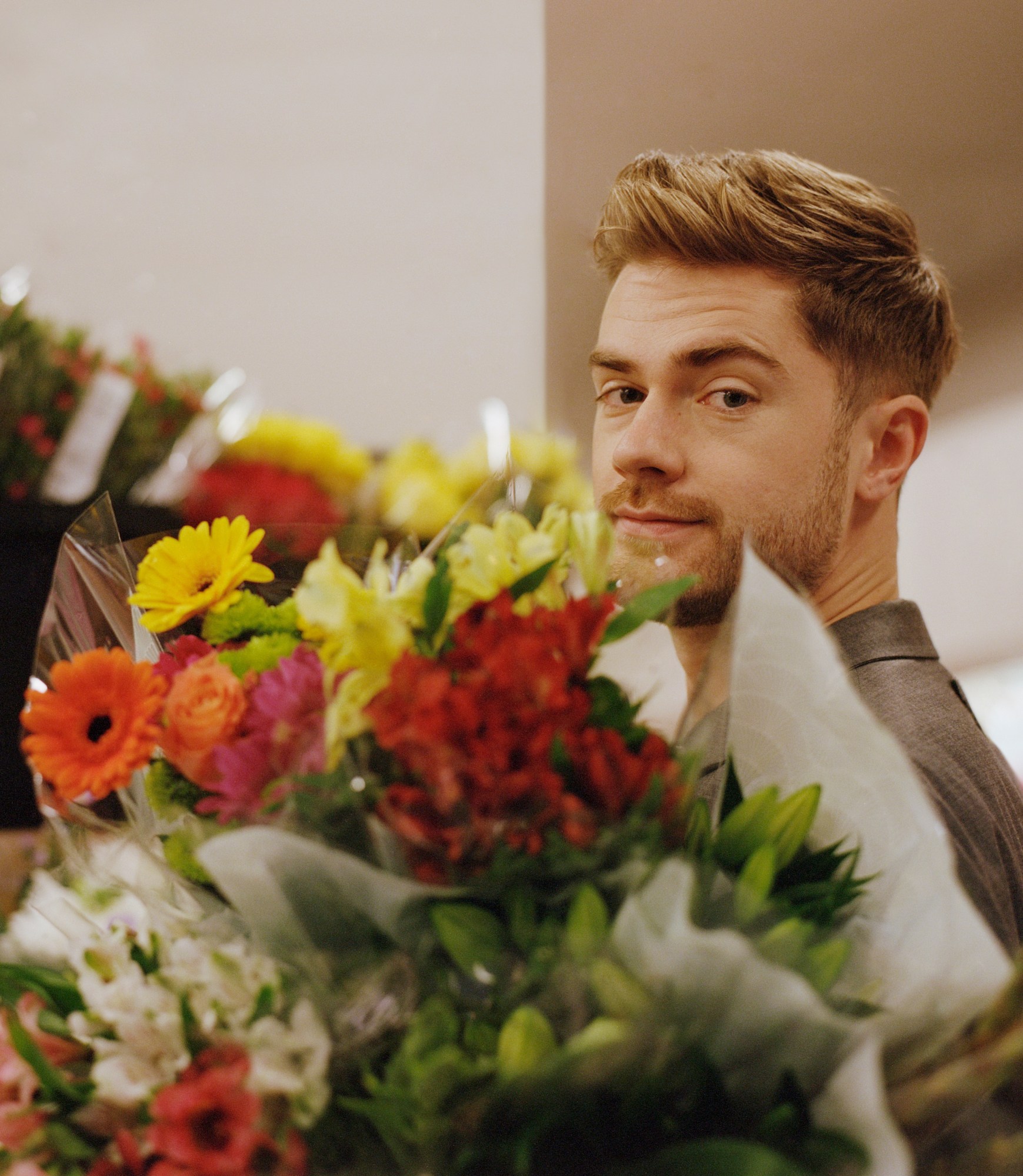Lukas Dhont is enamoured by everyday poetry.
“I love your jacket,” the filmmaker says when I walk into a hotel room to meet him. “Is it Chanel?”
I laugh. It’s not — I found it in a thrift shop, but he’s delighted anyway, waxing lyrical about secondhand clothing and the “horizontality” of objects from another moment in time. “They have a story, a life I wasn’t part of, yet one that has already been lived, once or twice. It’s about who wore that beautiful jacket before you.”
For Lukas, everything seems refracted through wondrous frames: a desire to unveil the hidden emotional lives below the surface of ordinary things. Like clothing, or flowers.
He’s been surrounded by flowers lately, the central symbol of his Oscar-nominated sophomore film Close, about the heartbreaking dissolution of a beautiful and intimate friendship between two 13-year-old boys. Portrayed with extraordinary depth and sensitivity by two new actors, Eden Dambrine and Gustav De Waele, the slow fracturing of Léo and Rémi’s relationship finds many parallels with the life cycle of flowers, where beauty is always a reminder of ephemerality.

Close begins with Léo and Rémi running through a blossoming field in the Belgian countryside, grinning and golden, limbs and lungs propelled by an expansive joy. Rows and rows of flowers paint an ecstatic blur of reds, pinks and yellows across the frame. “It’s a pivotal image, like boys running in a colouring book,” Lukas says of the scene’s youthful idyllicism. Its joyous exhalation of childhood freedom lands us in full bloom: for the next 15 minutes of the film, we’re immersed in the deeply affectionate bond the boys share with each other. Rémi has trouble sleeping that night; Léo tells him to imagine he’s a small duckling jumping on a trampoline to the stars, and mimics the sound of whooshing air with gentle breaths onto his friend’s shut eyes. When the camera cuts to them peacefully asleep, close together, it’s a deeply moving image of physical and emotional intimacy — one that, between two boys, feels quietly novel.
Lukas’ movie holds space for such intimacy, so simple yet often absent from our screens. “Young boys are incredibly emotionally intelligent, but we rarely [see] those images,” he says. “We’re bombarded with fighters, badasses, the Marlboro Man. That tenderness, those flowers — we don’t film that.”
But Close is inevitably about that tenderness cracking open under the weight of others’ gazes and judgement, and what kind of love we punish out of young boys. “There were two words on paper when I started writing the film. It was ‘fragility’ on one hand and ‘brutality’ on the other,” Lukas says. “I wanted to start in that fragile universe and have brutality slowly corrupt it.” When Léo and Rémi arrive at secondary school, their classmates deride the way they rest their heads on each other’s shoulders, or gently whisper to each other in class. “You’re always this close,” a girl giggles to Léo and Rémi, exchanging looks with her friend. Immediately, to be “close” twists into something ugly: we see how the words land on Léo’s face; the red-hot wilting of shame.
“For me, that school playground is the first time you’re confronted with the verticality of our society,” Lukas says. There is a hierarchy that so easily asserts itself, one that need not be spoken about bluntly to exercise its mundane cruelty. “You have this beautiful connection that is not labelled, that could be anything. And all of a sudden, because the outside world wants to compartmentalise exactly what that is, one of them starts to fear what they have,” he continues. The air has irreversibly changed between the two boys. Rémi will continue to reach for Léo, but Léo begins to push him away.
Lukas can remember his first brush with that emotion; in a roundabout way, it was shame that led him to cinema. For most of his childhood, he had wanted to be a dancer. “My mom would drive me to R&B class, ballet class, everything I could possibly do,” he tells me. “At the age of 13, I performed a dance routine to Christina Aguilera for my classmates. When I look back — wow, that was a courageous 13 year old. But it actually was not a great moment; I could feel the embarrassment of people around me because I moved in a very feminine way.” After that, Lukas stopped dancing publicly: it became confined to his bedroom, protected yet restrained within those four walls. Rémi’s bedroom in Close is a similar, albeit temporary, refuge.
Children, it seems, must quickly learn how to wear different masks in different spaces. Lukas often comes back to the moment when a “rupture between the public and the private” is formed in the lives of young boys: when those ubiquitous eyes descend on what was once free to run among flowers, dance without the knowledge of shame. “They come to understand that being a man in this world is being a bit more independent, a bit less vocal about emotion,” he says. “They start to become performers.”
But after losing dance, Lukas found another place of refuge in the darkened cinema and its promise of transportation. Growing up with a mother “who’s really a cinephile”, he says, fondly, movies had always been very present in his life. “She showed me that cinema was a way of escaping. As a kid feeling like I was falling in a gap between the boys and the girls — like there was not really a space I could inhabit — I found my home in a cinema quite often.” He recalls the revelatory impact of seeing Brokeback Mountain at the age of 15: “I was sitting in the dark with my classmates, watching two cowboys fall in love. And for that moment, I could feel something that I knew — as soon the lights went on — I would not be able to communicate. I began to understand that I wanted to use cinema in that way. A way of connecting to desire, to identity.”
His mother continued to be an essential presence in that journey, renting a camera for Lukas when he was off school, while he built film sets at home. “My brother and mother would be my actors, and I would direct them,” he says, smiling at the memory. “My mom recently digitised those videos, and it’s really crazy. A bit like, a childish Chantal Akerman?” The comparison to the lauded late filmmaker prompts mischievous laughter.
Close is a queer film. Not because it deals with sexuality, but because it is about otherness. It is a story about the cruel ways we leave each other behind, even as children, and asks where the root of such cruelty lies. “I think when we’re young, the force of wanting to belong to a group can be so strong that it makes us betray our own feelings and those we love most,” he says. His film painstakingly traces that betrayal; the shunning of a once-easy touch, or the realisation that no one is waiting for you on the way to school. The way isolation, so quickly and mercilessly, can eat into our bones.

It is a deeply tragic film, and for all of Lukas’ sunniness and warmth, he is a director evidently interested in queer trauma. His debut feature, Girl, won the Queer Palm at Cannes Film Festival in 2018; it was also criticised by some in the trans community for its graphic depiction of a trans teenage girl committing self-harm. I am interested in his perspective on portraying queer suffering, and why he felt compelled to take Close in the grief-stricken direction he did.
He reflects for a moment. “When it comes to young men, I think depriving them at that young age from that intimacy with each other, and with their own emotional worlds — creating that rupture is incredibly violent. And I think it’s important to speak about violence in our work: the violence that a society full of expectations, norms and codes, has created for people.” But perhaps he is discovering less explicit languages to do this with. There are no graphic depictions of violence in Close, but rather everything that precedes it and the jagged shards it leaves behind. “It was important that there was violence lingering through the film, without being concretised within it,” he elaborates. “In a cinematic language, I think I’m more interested in implosion than explosion.”
Navigating the fallout of that implosion, Close asks what it feels like to pick up the pieces, and find yourself reflected in the shrapnel. “In that male universe, I wanted to talk about the feeling of responsibility because it’s also an image you don’t often see; it’s a feeling that can sometimes trap us in our bodies because we can’t vocalise it,” Lukas says. But his film traces the emotional topographies of guilt and grief while understanding that responsibility for harm must be collectively held. Violence, after all, stems from a system of brutality: one that “tells young men to not invest in tenderness, to not invest in care,” Lukas says, “but to invest in independence, in creating an armour. And inside that armour — I’ll be poetic — there’s a lot of souls dying.”
“As a human being, I’m much more interested in the tender than in the brutal, although I do want to address it,” he emphasises. I offer that, for him, perhaps they’re inextricably entangled — the beauty of those flowers, their fragility and strength amidst hostility.
“They are quite entangled,” Lukas responds. “And I think I’m trying to look for ways to touch both, but still be able to create more tenderness than brutality.”
‘Close’ is in UK cinemas via MUBI on 3 March. It is in US theatres via A24 now.

Credits
Photography Richard Dowker


